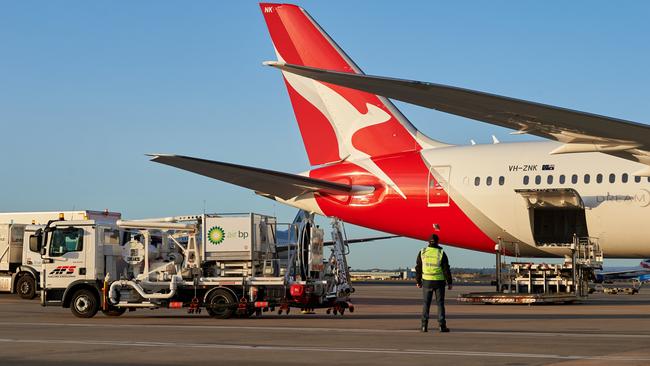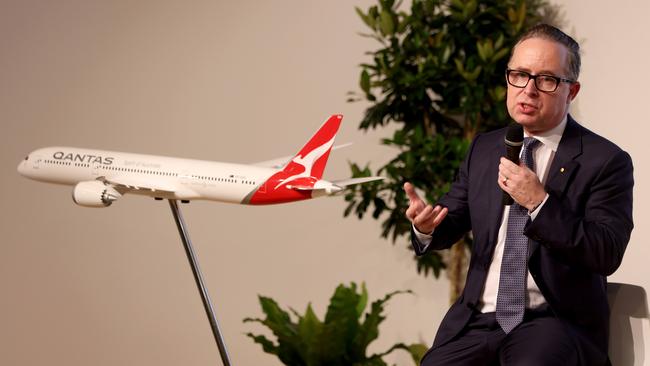Qantas CEO says airlines’ ‘rusty restart’ after Covid not surprising
The ‘rusty’ restart of the aviation industry is proving a hot topic of discussion for airline chief executives meeting in Doha this week.

The “rusty” restart of the aviation industry is proving a hot topic of discussion for airline CEOs at the International Air Transport Association annual general meeting in Doha.
Speaking ahead of the meeting on Sunday, Qantas CEO Alan Joyce said sustainability and the industry restart were two of the biggest issues for airlines.
He said it should not be a surprise that bringing airlines out of hibernation after Covid was proving a challenging task.
Qantas has faced significant criticism in recent weeks for everything from poor customer service and lost bags to delayed and cancelled flights, but Mr Joyce said the problems were widespread across the industry.
“What we’re hearing from every airline is the issues with a rusty industry trying to get it flowing again, to get it back to the precision instrument it used to be,” said Mr Joyce in Doha, where he is attending the International Air Transport Association’s annual general meeting.
“(Airbus CEO) Guillaume Faury was telling me about the supply and logistics issues the manufacturers are having. KLM was telling us at Schiphol Airport (in Amsterdam) it’s a three-hour wait for security. At Dublin Airport, it’s a five-hour wait. They’re talking about capping the number of departures from some airports.”
He added that there were “massive delays at Heathow Airport as well as massive lost bags”.
“We’re in the same boat,” Mr Joyce said.
“We’re not having as significant issues as some airlines but we are adjusting schedules just as we did with call centres to get service levels back to where we want them to be.”
He said Qantas was now focused on fixing operational issues to get the airline’s on-time performance back to where it was before Covid-19.
Recent data from aviation analytics firm OAG showed the airline was lagging most other similar sized carriers for on-time performance, and had a much higher rate of cancellations, at 6.9 per cent in May.
“We think in the weeks ahead we will have fixed that and that is the same issue I think the whole industry is facing out there. That’s the restarting of a business that’s been in hibernation for a couple of years,” said Mr Joyce.
“I don’t think it should be a surprise that it’s a bit rusty and it’s going to take some time getting the system right and as efficient as it was before Covid.”
Mr Joyce also announced a $200m partnership with Airbus to build a sustainable fuel industry in Australia, to help Qantas reach it target of net zero emissions by 2050.
The Qantas boss has long called for government support to develop an industry, and said encouraging discussions had been held with Minister for Energy and Climate Change Chris Bowen.
Funding would go to “commercially viable projects that met a strict set of criteria around environmental sustainability”.
“The use of SAF is increasing globally as governments and industry work together to find ways to decarbonise the aviation sector,” said Mr Joyce.
“Without swift action, Australia is at risk of being left behind.”
In addition to funding, the government would need to provide a regulatory framework for SAF to ensure costs came down over time and did not drive up the price of airfares.
Airbus’s involvement in the partnership was secured during negotiations for a massive aircraft order from Qantas, worth billions of dollars.
As well as a dozen A350-1000s to fly Qantas’s ultra-long-haul flights, Airbus aircraft will replace the airline’s domestic fleet of Boeing 737s and 717s.
Mr Faury said the partnership with Qantas to develop SAF in Australia reflected the two companies’ shared commitment to act as catalysts of change in the industry.
“The increased use of sustainable aviation fuels will be a key driver to achieve net zero emissions by 2050. But we can’t do this without viable industrial systems to produce and commercialise these energy sources at affordable rates and near to key hubs around the world,” Mr Faury said.
“This is especially true for a country like Australia, which is geographically distant and highly reliant on aviation to remain connected both domestically and internationally.”
.







To join the conversation, please log in. Don't have an account? Register
Join the conversation, you are commenting as Logout